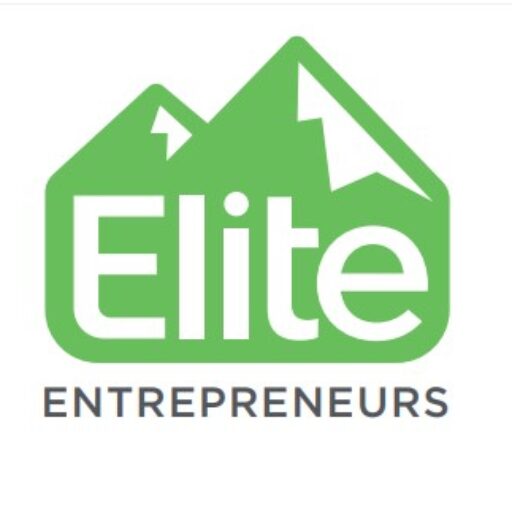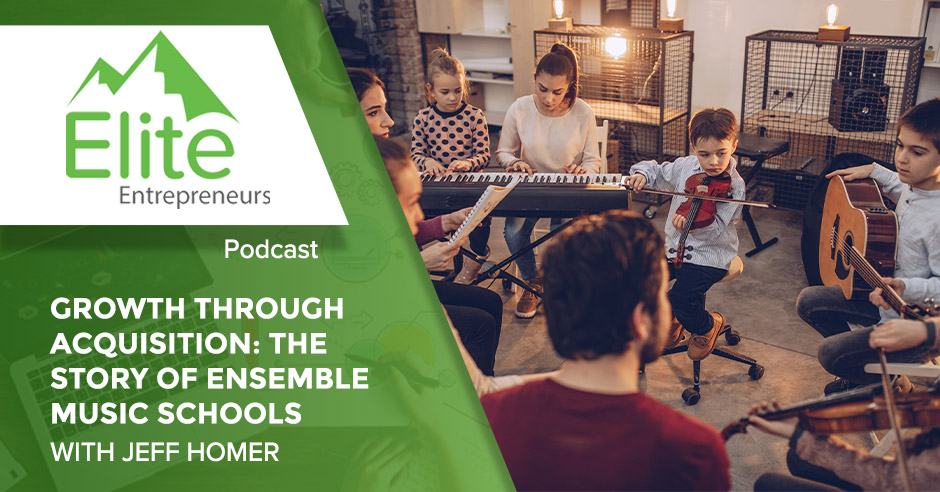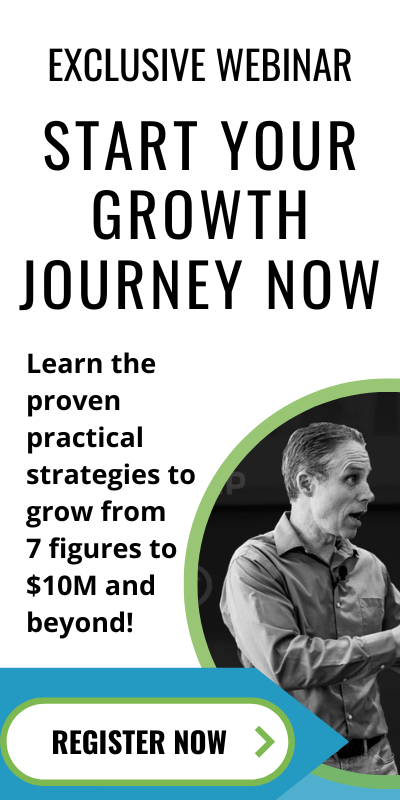Episode 126: Growth Through Acquisition: The Story Of Ensemble Music Schools With Jeff Homer
Watch the episode here
Listen to the podcast here
How do you earn $10 million plus in just two years? You can’t do that by going from zero to one in a business, but it’s certainly possible through acquisition. This kind of growth through acquisition model is what Jeff Homer used in building Ensemble Music Schools. Coming straight out of private equity, Jeff married that expertise with his love of music as an amateur musician to build a business that means something to him. In this episode, he shares the challenges of opening 22 branches and building the whole of his business mainly through acquisition. If you have the money to spare and you think this can be a wise strategy for you, tune in and take notes!
—
In this episode, we have a guest with us who has built a business from 7 figures on up until the $10 million plus, 8 figures range. His name is Jeff Homer. He is the Founder of Ensemble Music Schools. They have several locations throughout the United States, which he started up in 2019. A couple of years later, you’ve got how many locations, Jeff?
Twenty-two.
That’s quite a fast path. It will be part of the fun conversation that we have. Jeff, thank you for spending time with us. We’re glad you’re here.
Likewise. I appreciate the time. I’ve read many episodes of the show. I’m a big fan so I appreciate what you’re doing for the community.
Thank you for that. We don’t often get people in the show who have the background that you have. You come out of private equity. You know what it’s like in that world to find great investments, push money around, bet on companies, and all that. You decided that you’re going to leave that world and build your business through acquisition largely. Let’s talk about that because that’s a fascinating way to build a business as quickly as you have.
It is a little bit interesting. I raised some eyebrows when I told people I was quitting my day job. It’s a path I came to organically and almost accidentally. I’d love to tell you that I sat down at the very beginning and charted this course to where I am. That would not be true. That would be significantly revising its history of it.
In actual fact, the quick version of my background is that I was a Harvard undergrad and out of school. I spent a couple of years working for Bain Capital. I moved to New York City. I was working for a midsize private equity firm called Reservoir Capital. In 2018, I moved from New York to Denver, which was a significant upgrade in terms of my quality of life. I went to a family office, investing capital on behalf of three wealthy Denver families.
I found that not living in New York and not working Wall Street hours, I had a lot more time on my hands. I don’t have enough hobbies because I felt like I needed a side hustle of some kind. I started looking around for small businesses that I could get involved with and that would allow me to have a fun and rewarding financial project but also something that had a level of tangibility that existed in the real world in a way that investing hundreds and millions of dollars do not. It’s that abstract reality in a strange and sometimes uncomfortable way.
I wanted to get involved in a local business. I took a bunch of meetings with sellers across a number of different industries and I came across a music school that was for sale. I walked in and was instantly transported back to my childhood taking piano lessons. I was thinking to myself, “I had the same piano teacher for ten years when I was a kid.” I don’t think that’s an unusual experience.
Here’s a place where students are coming, having a fun time, and staying for a while. You have recurring revenue and a high customer lifetime value business that is run by well-meaning technicians. Music school owners are generally musicians, which puts them in the same category as veterinarians, dentists, and other people that are seeing this transformation happen in their industry, where we’re trying to separate the job of providing the service from the job of running the business.
That was the insight I had into music schools. We went in there and took what was an excellent product delivery business. The kids were having a great time and experience but the business was not especially well run in the way that you and I would think. It was under-marketed. They were doing pen-and-paper scheduling and time sheets. There was a lot of obvious opportunity for somebody like they’ll be reading this show.
I got in there. From there, it was a process of doing what I had fun doing. From the 1st location we bought through the 4th location we bought, I still kept my day job. I was spending more time on this side project, sleeping less, and having to explain my absences more. It was clear to me what I wanted to be spending my time doing. With location number five under my belt, I was able to make the jump. I quit my day job and I’ve been doing this full-time ever since. It’s been fun.
You spent some time in big PE firms in New York City and found a little work-life balance in Colorado, which is awesome. I lived in Colorado for a time so I can get that. Before you ended up in New York, where were you from?
I grew up in Calgary, Canada, which I like to refer to as mini-Denver. It’s like the same place, just about 1/3 of the size.
You explained that these kids are having a great customer experience. As far as how the businesses run, there’s lots of improvement that we can make with systems, automation, and all that stuff. Is there anything more that drew you? You did piano lessons for ten years. Why music school?
There was a personal connection to it. I felt right away that there was a warmth to this environment and I was excited to spend time in it. I felt like music education is something that is a societal good. It felt good to be working on and promoting something that I believed in. I am by no means a professional-caliber player. I feel that acutely every day now that I spend a lot of time around very talented people. I can play okay. That’s brought me a lot of joy in my life, even as an amateur hobbyist. I believe in the product and that’s a useful thing to be spending time trying to promote.
There were some qualitative aspects of it that appealed to me. More to the point, I felt like this was underappreciated. It was music so people didn’t look at it seriously as a business opportunity. There was an assumption that in the arts, you can’t make money. That was driving me to say, “This is a pretty sticky revenue base and a high-value customer in a pretty mom-and-pop competitive set that we can do well against.” That drove me to feel like there was an opportunity in the space.
It’s only been a couple of years and you’re up to 22 locations. Most of our readers will not have built their business through acquisition. Let’s talk a little bit about the pros and cons of that. Fast growth is some potential upside but what have been some of the challenges? Why might somebody consider growth through acquisition?
The obvious answer is that it is the ultimate accelerator. Going from 0 to 1 in business is so difficult. We generally are benefiting from years and in many cases, decades of investment by the original owner in building a great relationship with their community, which we then benefit from and can strap a jet pack onto from a marketing perspective. For us, it makes a lot of sense. Our biggest advantage has been accessing capital. I have a privileged background. I was able to call up people I’d worked with. They were willing to write large checks personally into our growing business and were able to pitch the banking market on our business model being a viable approach.
There’s a lot of money out there looking for interesting things to do. That’s more possible now than it ever has been as private equity has come down market and bank lending standards have, to the benefit of your audience, declined. There’s a much more robust network of individuals that are out there doing angel and angel-like investing in small businesses, whether they have venture moonshot potential or robust growth opportunities.
There’s capital out there. Scaling by acquisition is a way to leverage your time in an unbelievable fashion. For us, the insight that we have is about how to professionalize the back end of the music business and market it effectively to grow the community. What we have a hard time doing is putting together that tenured and excellent faculty that takes care of those students and all the effort in community building. That takes a long time. For us, we’re able to come in, essentially benefit from, and leverage that incredible work that’s been done by the sellers over many years.
In some ways, we’re almost fulfilling their vision for their school. We’re taking it to where they thought that it could go but maybe couldn’t get it there themselves. We’re making sure that all those talented faculty have full schedules and are making as much as they’d like to be making from their teaching time and making sure that the students are part of a vibrant community where other students are participating in performance opportunities and competitive opportunities. We’re not going from 0 to 1, which is hard to do but we’re taking it from one to hopefully high multiple events that fulfill the original vision for the business when the seller started it many years ago.
With those good musicians and passionate teachers of kids, how many of them are staying versus looking for a way to get out?
Rough numbers, I’d say about a quarter are staying. Oftentimes, by the time someone’s contacted us, they have taken a step back from teaching entirely. They’re often chief administrators by the time they’re looking to exit their business. In some cases, they’re looking to sell the school so they can go back to being a teacher. They got into the business as a teacher and got away from it because scaling their small business was so overwhelming and consuming that they had to give up being the teacher.
That was a lot of what brought them joy. They want to get back to that as a twilight, easing into retirement or even a full-on retirement plan. It’s very doable to teach a few days a week for fun as a semi-retired person. About a quarter are staying involved usually as teachers, sometimes as general managers. It’s been fun. For us, we’re always trying to create those win-win situations. We’re never a hostile acquirer. That’s not possible in the small business world.
We’re always trying to create win-win partnerships and figure out what the seller wants to be doing next in their career and helping them get onto that, whether it’s focusing on a young family, going back to teaching, or starting an unrelated business. We’ve had one guy that wanted to go be a missionary in Kenya so we’ve seen the whole gamut at this point.

Growth Through Acquisition: We’re always trying to create win-win partnerships and figure out what the seller wants to do next in their career and help them get onto that.
What is the end game for you? As long as there’s private equity money out there or investible money, are you planning to buy up more of these locations? Do you have specific geography that you want to cover? What are your thoughts about the future?
Our business has a lot of similarities to the academic tutoring business. If you think about the type of person that shows up at a Sylvan, Mathnasium, or Kumon Learning Center, that’s a similar parent to someone that’s bringing their kids to music lessons. They’re academically inclined. They have disposable income that they’re willing to spend on their kid and they’re making sure that that kid is successful, high achieving, and making progress either in their personal growth or academic resume towards competitive prep school, college opportunities, and things like that.
Those franchises I mentioned, the Kumons and Mathnasiums of the world, have about 1,000 to 1,500 US locations each. At 22 schools, we’re a long way from maximizing the potential of what we can do in the music education space. There are decent-sized franchises in our space like School of Rock, which everyone probably lives pretty close to, which has about 220 US locations and there are a few other smaller ones. It’s possible to build a business in our space that has a couple of hundred units and that’s going to take a long time. I’m committed to working towards that.
At 22 schools, we're a long way from maximizing the potential of what we can do in the music education space. Share on XThe fun thing about this journey and why I’m motivated to continue it has been that to this point, the promise, in my opinion, has been fulfilled that the schools have benefited from being part of this larger network. Each school that comes onto our platform gets the benefit of centralized resources that they never had as an independent school. I like to refer to them as the 10:00 PM tasks, the things that the prior owner was doing at 10:00 at night after the students had gone home for the day.
Accounting, payroll, and some semblance of marketing.
All of those things are being done by people who love those things and are good at them. Professionalizing that part of the business doesn’t touch students, parents, and teachers. It means that it doesn’t affect their experience and we can still stay true to that local neighborhood feel that they had previously loved while still being able to scale and professionalize the back end. That’s worked.
I don’t see a reason why that won’t continue to work for us as we are able to split the hyper-personal delivery of the service, which is the one-to-one relationship with a music teacher and the hyper-scale backend that we’re working to build as we’ve gone from 1 location to 22 locations in a relatively short period. That’s working. There’s no reason to stop that momentum and try to exit, pivot, or do something different. I’m having a lot of fun doing it and there’s a lot of runway remaining.
Anybody who knows that story can pick out lessons along the way that you’ve already shared without even labeling their lessons. Let’s officially get into some labeled lessons. As you’ve grown and you’ve grown quickly, tell us about some of the lessons around building that team. Not the local site but there’s the back-end work that you talked about and you’ve had to build a team. I imagine you’re putting together a leadership team. If you haven’t done that yet, it’s coming fast. Let’s talk about some of the lessons you’re learning as you’re growing in your leadership and having to develop the organization of Ensemble Music Schools. What’s that been like for you?
Hopefully, I can provide some useful answers. I came to your show looking for others’ answers to that so hopefully, I can add a few to the list. We’ve gone through the transition that you’re describing in your audience in terms of building a business from $1 million to 10 million plus of revenue. A $1 million business is a small business and a $10 million business is on the cusp of being a medium size business. Those are very different things. It has been an incredibly painful thing to go quickly from being a small business to being a middle-market size company.
The most important thing that I’ve had to do over that period has been to get myself out of the way and stop trying to be an individual contributor. That’s my nature. I want to be in there doing and helping things. “I can do this so I will do this.” When you put yourself in that position and then the phone rings and you get distracted by something else, an emergency happens or something else comes up and bumps that down the list of priorities, it doesn’t happen for the entire business.
Decreasing the number of items on which I am the primary individual contributor and ultimately trying to manage that down to zero has been one of the biggest projects I’ve been working on over the last few years. I’m still driving the acquisition process for our business in terms of new schools. Relaying our message to prospective sellers and helping to guide them through that process is still something I’m deeply involved with.
I’m trying to reduce the reliance on myself and that part of the organization. Elsewhere, we’ve made a lot of progress in terms of building up a good team and empowering them to get stuff done if I’m away from my desk dealing with something else. That’s been by far the most important thing that I’ve had to work through. Something that is emphasized in our acquisition growth strategy has been trying to battle complexity.
We’ve acquired 22 locations. I guarantee you that they had 22 different ways of doing pretty much everything that they did. Standardization and battling complexity has been critical to have our business able to be managed, as opposed to an aggregation of little fiefdoms that don’t talk to each other and are not part of a larger whole. Standardization can be painful. It often means implementing changes that people don’t see value in or don’t like better than the ones that they had before. We’ve tried to be sensitive to what’s the best of each that’s available at the subsidiary level.
Standardization can be painful. It often means implementing changes that people don't see the value in or don't like better than the one that they had before. Share on XWe’ve learned a lot from putting those things together, taking the best of A, best of B, and best of C, and ruling them out everywhere. It raises the average and the bar for our business over time. Battling complexity, trying to enforce standardization, having standard operating procedures, making sure they’re communicated and disseminated clearly, and making sure people follow them has been a big point of emphasis as we’ve grown, probably from 5 schools to 20 schools for sure.
It seems like that central leadership team would be important but also that general manager role, and I heard you use that term for the local leader, would be a key role for you. What have you learned about how to get the right person in there who’s willing to make some of these changes, especially as we find a new thing with the next acquisition that’s even better? We want to go back and roll it to everybody else. That general manager role is probably key. What have you learned about what that role looks like and how to hire the right person and work with them? I’m fascinated by that.
That’s a super interesting question and one that we’re still working on ourselves. Of our 18 general managers, we’ve probably hired about 1/3 of them and 2/3 of them came with the businesses we bought. There are folks that have seen a big change in a community that they care about. First and foremost, we benefit from the fact that this is an arts-focused organization. We get people that deeply care about what we’re doing and the service we’re providing. We probably get a better-than-average candidate as a result of that.
What we’re trying to do with that individual is turn them into a franchisee of sorts. We want to give them enough operating support to where they can run it like it’s a subway and make sure that the sandwich gets made the way that you expect. What we’re asking them to do is deliver a great client experience and a great experience for our teachers. Those two things are complicated, sensitive, require empathy, and hard but that’s clear. What you’re focusing on as a general manager are the people that walk through the door. If you can do that, we’ll take care of the rest. It’s been a productive division of labor and one that they’ve all stepped up and grown into. It’s been rewarding to see.

Growth Through Acquisition: What general managers need to do is deliver a great client experience and a great experience for our teachers. We’ll take care of the rest.
It’s super fascinating as you think about acquiring the technical skill of music and then trying to apply a standardized way across an increasing number of locations. I can imagine some of the challenges but what a cool strength to start with. You have people who know how to deliver the result. That’s key. I love your focus on if we build the team right.
As long as that general manager can hire the right team to deliver and maintain a level of standard excellence around the experience for students, that’s a long-term customer, as you’ve pointed out. Even on the short end, a kid quits piano lessons in less than 6 or 8 months. You get some value out of everybody that comes through. In your case and in many, it’s a years-long journey. I could probably geek you out on this conversation for a long time. You’ve got 22 schools and counting.
Some of them are stores. We have a good mix of music retail in addition to music lessons.
They do the product and the things. They have both. That’s cool. Schools and stores. You have a lot to do. If people reading want to connect with you or want to learn about if there’s an Ensemble Music Schools near them, how would they look that up?
If they’re looking for a music lesson, we’ve already been in front of them with a targeted ad. Hopefully, that’s the case. If they want to get in touch with me, I’m active in a couple of places. I’m pretty active on LinkedIn, @JeffHomer Ensemble Music Schools. It should be pretty easy to find. I’m also part of a couple of entrepreneurship through acquisition platforms. One, in particular, is called SEARCHFUNDER. If people want to join that community, especially if they’re interested in entrepreneurship through acquisition, I recommend it. I’m not affiliated with that community. I’m just a member of it. It’s great and I get a lot of value from it. If you want to learn more about our business, we’re EnsembleSchools.com. We look forward to serving you if you need piano lessons.
Jeff, it’s been a pleasure. It’s unique how you’ve grown this so far. $10 million plus in 2 years, part of that time you were still employed. It’s high growth and that’s what growth through acquisition can do for you. A lot of the challenges you’re dealing with typically happen a little slower over a longer period. Maybe I said the same thing twice there but you get the gist of it. It’s more gradual. It’s fun to see that type of change and all the interesting leadership challenges along the way. Thank you for sharing your story with us and being our guest in this episode, Jeff.
I appreciate the time.
Everybody else, please rate, review, like, share, and do all those things to make sure that as many seven-figure business owners as possible get to know what Jeff shared with us. We’ll continue to bring guests like Jeff each episode or I’ll share something that I think is important for you as well. We look forward to having you with us next time on another episode.
Important Links
About Jeff Homer
 Jeff founded Ensemble Music Schools in 2019 as a passion project that promised to combine his hobby as an amateur musician with his professional background in investing. Starting with just one school in Louisville, CO, Jeffs vision was to build a best-in-class administrative platform that would equip local community music schools to thrive in the digital age and better serve their students and teaching faculty. Motivated by some early successes and the blessing of doing what you love, Jeff left his day job to focus full-time on Ensemble in early 2020 and hasnt looked back! Jeffs prior employers include institutional investment firms Bain Capital, Reservoir Capital, and Independence Capital Asset Partners. Jeff graduated magna cum laude from Harvard University with a degree in Economics.
Jeff founded Ensemble Music Schools in 2019 as a passion project that promised to combine his hobby as an amateur musician with his professional background in investing. Starting with just one school in Louisville, CO, Jeffs vision was to build a best-in-class administrative platform that would equip local community music schools to thrive in the digital age and better serve their students and teaching faculty. Motivated by some early successes and the blessing of doing what you love, Jeff left his day job to focus full-time on Ensemble in early 2020 and hasnt looked back! Jeffs prior employers include institutional investment firms Bain Capital, Reservoir Capital, and Independence Capital Asset Partners. Jeff graduated magna cum laude from Harvard University with a degree in Economics.
Want to listen to more? View all episodes here >



